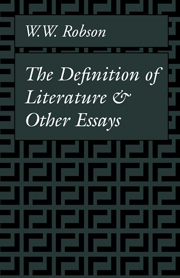Book contents
- Frontmatter
- Contents
- Preface
- Bibliographical note
- 1 The Definition of Literature
- 2 On Liberty of Interpreting
- 3 Evaluative Criticism, and Criticism without Evaluation
- 4 The Novel: a Critical Impasse?
- 5 The Sea Cook: a Study in the Art of Robert Louis Stevenson
- 6 On Kidnapped
- 7 On The Wind in the Willows
- 8 The Present Value of Tennyson
- 9 Robert Frost
- 10 Hopkins and Literary Criticism
- 11 T. S. Eliot: a Poet's Notebook
- 12 I. A. Richards
- 13 Yvor Winters: Counter-romantic
3 - Evaluative Criticism, and Criticism without Evaluation
Published online by Cambridge University Press: 01 June 2011
- Frontmatter
- Contents
- Preface
- Bibliographical note
- 1 The Definition of Literature
- 2 On Liberty of Interpreting
- 3 Evaluative Criticism, and Criticism without Evaluation
- 4 The Novel: a Critical Impasse?
- 5 The Sea Cook: a Study in the Art of Robert Louis Stevenson
- 6 On Kidnapped
- 7 On The Wind in the Willows
- 8 The Present Value of Tennyson
- 9 Robert Frost
- 10 Hopkins and Literary Criticism
- 11 T. S. Eliot: a Poet's Notebook
- 12 I. A. Richards
- 13 Yvor Winters: Counter-romantic
Summary
Literary criticism has traditionally been regarded as evaluative, or judicial. But over the centuries this notion of it has come to be questioned, and itself ‘evaluated’ adversely. With the recent deaths of leading figures – Edmund Wilson, Lionel Trilling, F. R. and Q. D. Leavis – who were critics of this kind, the Anglo- American literary scene has been left for the present without a great critical pundit. And I cannot help wondering whether there is likely to be another. Is the idea of evaluative criticism really compatible with rational discussion, as that is understood nowadays? Does it belong with other, now discredited ideas of authority in regions of discourse where no authority can respectably exist? This seems a suitable moment to have another look at the notion.
The first thing to note is that evaluative criticism is not itself a distinct literary genre. There are such things as ‘critiques’, but they do not by any means make up the entire field. Much valuable criticism occurs in letters, or in records of conversation. It can be found in novels, or poems: Shelley's Peter Bell the Third contains some illuminating criticism of Wordsworth. It can appear, as we would expect, in biographies of writers, such as Johnson's Lives of the Poets. Conversely, most critics have seen it as their business to inform their readers about other matters besides the value of authors' work.
- Type
- Chapter
- Information
- The Definition of Literature and Other Essays , pp. 40 - 56Publisher: Cambridge University PressPrint publication year: 1982



